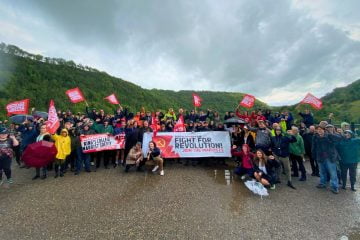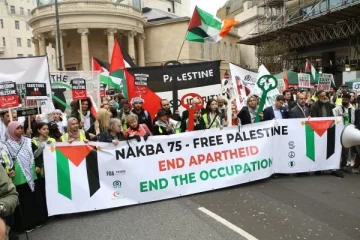In truth, there are many experiences and thoughts which have led me to Marxism. Having traveled extensively as a child, it’s hard not to visit the Global South and its poor masses and question the economic structures which exploit them. Also, as the son of a father whose childhood experiences of brutal poverty were repeatedly recounted at the dinner table, how could I not think we could do better? Yet, it was my foray into the history of liberation movements, with a little family history stirred in, which convinced me that there is no other option but to fight.
My mother’s side of the family hails from Nairobi, Kenya, part of a community of Indians brought over by commerce and empire. Her father was a humble book-seller, but also a member of the Kenyan Communist Party. She recalls him joining dockworkers on the picket line, and almost being deported by a Kenyan government keen to stave off growing socialism in East Africa, in favour of courting the favour and business of their British ex-pillagers.
Like many other countries under Western imperialism’s yoke, Kenya gained independence through revolution. The Mau Mau uprising sought to drive off the British and restore Kenya to the Kenyan people. Elsewhere, throughout the 20th century, independence movements were inspired by socialist ideals: the successful Viet Cong resistance to US intervention, Indian martyrs like Shaheed Bhagat Singh, Angolan liberation from Portugal, the South African anti-apartheid movement, to name a few.
However, the momentum of revolutionary movements such as these have, in the past, been halted or even reversed by both internal and external forces. Often, revolution has been popular but not fully organised. The movements may have revolved around a central figure, which helps bolster morale, but that could not act as a replacement for a genuine working-class organisation, and a genuine revolutionary party. Alternatively, revolutions have been led by a bourgeois liberal elite whose intentions are simply to shuffle positions at the top, with no fundamental change to the rest of society. And of course, the threat of external capitalist elements has, in the past, suffocated the economy and thus the revolution. Without the right revolutionary theory, tactics, and party, revolutionary movements have been led down a path that leads to counter-revolution. In each case, the empire has been allowed to strike back, and capitalist dictatorship has returned, with a new face, empty nationalist rhetoric, and a Swiss bank account.
Take the case of Thomas Sankara, the Marxist-inspired, pan-Africanist revolutionary in Burkina Faso. Dubbed the African Che Guevara, he pushed forward mass vaccination, reforestation, and female empowerment. Though his popularity waned with the notorious Popular Revolutionary Tribunals and suppression of workers’ unions, his end came with the bullet, not the ballot. Blaise Compaoré, comrade-turned-traitor, had Sankara assassinated, and rolled back most of his reforms. State assets were immediately privatised, and Burkina Faso rejoined the IMF and World Bank (and with it came the return of odious debt). In Kenya, despite its success in gaining independence, the revolution was also eventually betrayed by capitalist and tribalist interests.
As I write the first draft of this article in Cuba (on my elective), Raul Castro’s promotion of private sector enterprises (including the casa particular I am staying in) shows that the revolution can be derailed not only by violent coup d’etats, or the greed of individuals, but also the slow suffocation of socialist states in isolation. Truly, the revolution can only endure if it is global.
Of course, not all anti-imperialism is socialist and progressive. While both philosophies share a visceral rejection of foreign exploitative capitalism, and often value the welfare of the many over the interests of the few, there are of course examples of right-wing anti-imperialism. Khomeini may agree with Castro or Maduro on the danger of Western capitalism and hegemony, but Iran’s conservative and regressive policies which harm the most vulnerable are detrimental to long-lasting power for the majority of people. It’s important to remember to look beyond the fiery rhetoric that promises freedom, and make sure that freedom is afforded to everyone, not just a small layer at the top.
So, why do I fight? I fight to help save our future revolution from the mistakes of past ones, to afford freedom and justice to all the oppressed, by building on the legacy of those revolutions that came before. This can only be achieved through the building and co-ordination of the International Marxist Tendency, which prioritises a clear understanding of Marxist theory, strong revolutionary leadership, and international solidarity.
I fight for the oppressed working class of Norwich (my home town) and Nairobi. I fight for a philosophy that is robust in its logic and genuine in its compassion. I fight because I can, and because I must!
by Rahul Mehta, Imperial College Marxists




1 Comment
Benedict Wachira · October 4, 2018 at 10:15 am
Hello,
Can i get the contact of the author?
~ a Communist organising in Kenya